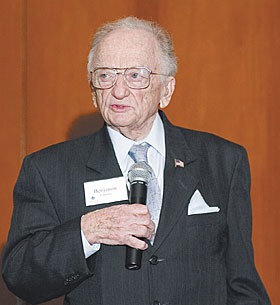  |
| HOME | THIS ISSUE | CALENDAR | GRANTS | BACK ISSUES | < BACK | NEXT > |
Former prosecutor draws lessons from Nurembergby Sherry Fisher - November 14, 2005
|
||||
|
“The camps were usually covered with dead bodies,” said Benjamin Ferencz. “Sometimes you couldn’t tell if they were dead or alive. The crematorium was still going, bodies piled up like cordwood waiting to be burned. The SS usually had fled. I would go into the office, get the records – they kept a very careful registry of all the people who were killed. Pages and pages and pages. I would take that back to headquarters and write up a report.” Ferencz, renowned human rights advocate and former prosecutor at the Nuremberg trials, was among the troops who liberated Buchenwald and other Nazi concentration camps. It was his job to collect evidence of the atrocities. He expounded on his experiences as a war crimes investigator during a talk Nov 7 in Konover Auditorium at the Thomas J. Dodd Research Center. The audience, mostly students, packed the room to hear the 85-year-old lawyer. Ferencz’s presentation was the 11th Raymond and Beverly Sackler Distinguished Lecture. A Harvard Law School graduate, Ferencz joined the army in 1943 and fought under Gen. George Patton. After being honorably discharged as an Army sergeant, he was recruited by the Pentagon for the Nuremberg trials. He was given the rank of general and, at 27, had the task of prosecuting 22 Nazi defendants. The defendants were members of mobile killing squads, and were charged with the murder of more than a million people. All were convicted, including six Nazi generals. Thirteen were sentenced to death. “I was given a staff of 50 people to go through the German archives in Berlin,” he said. “A lot was destroyed, but there were still records in different places. “One day, one of my research analysts handed me a big looseleaf binder,” he said. “The papers were top secret, in German, about the special extermination squads. Their job was to go behind the German lines and murder in cold blood every single Jewish man, woman, and child they could lay their hands on, every gypsy, and anybody else who posed a potential threat to the Third Reich.” The reports gave the name of the commanding officer, the unit, the location, and how many people were killed, Ferencz said: “They never said ‘murdered’. They said ‘got rid of,’ ‘eliminated,’ ‘transported,’ or ‘removed.’ They always used some euphemism. But to the victims, it meant they were dead. “I took a little adding machine and I began to add them up, and when I reached over a million people killed, I stopped adding,” he said. There were already 12 trials in progress, but Ferencz told authorities, “you can’t let these guys go. Gen. Taylor asked if I would be willing to handle the case in addition to my other work. I said sure, and lo and behold, I became the chief prosecutor of the United States at the age of 27.” Ferencz said he picked the defendants by their rank and education. Almost all had doctorates.
“Why did they do this?” he asked. “What was their mentality? What were they thinking? These are educated men. I posed the question to my lead defendant: ‘How do you justify killing 90,000 people?’ He said, ‘Very simple, it was self-defense. We knew that the Soviet Union was planning to attack us, so it was necessary in anticipation of that attack, for us to beat them to the punch and attack them first.’ “‘Why did you kill all the Jews?’ I asked. ‘Well everybody knows the Jews were sympathetic to the Bolsheviks, so we eliminated them too.’ There was no remorse. “It was a terrible thing,” Ferencz said. “The trauma of that experience of being a witness to the horror of these camps and the explanation of the mass murderers. I decided to devote the rest of my life to trying to create a humane and peaceful world.” Ferencz chastised the United States for the current war in Iraq, and for rejecting the International Criminal Court. “Why are we at war in Iraq?” he asked. “Anticipatory self-defense. We ‘know’ they had been planning to attack us with weapons of mass destruction, therefore we feel justified in disregarding the United Nations charter, which outlaws the use of force. " Therefore, 2,000 American boys are now dead and many thousands of Iraqis are now dead. “Some people believe only in the use of force. Some people believe in the rule of law. There is no such thing as a war without atrocities. And in every war – I don’t care what the rules are – you are going to have atrocities. " I know of no other way to prevent atrocities than to prevent war-making itself.” |
| ADVANCE HOME UCONN HOME |

